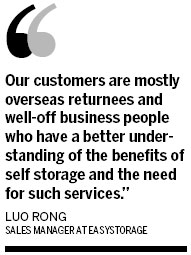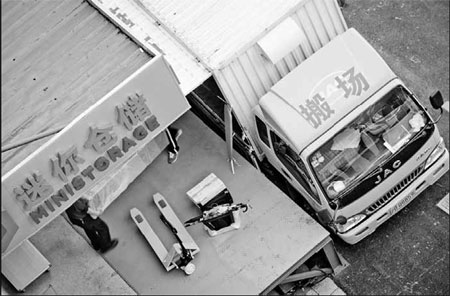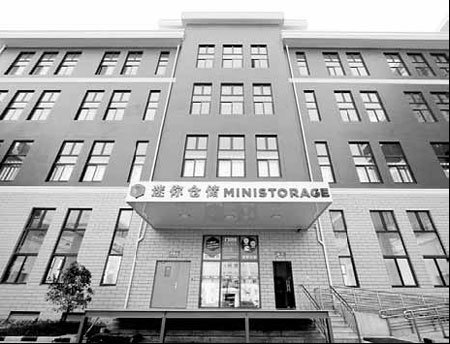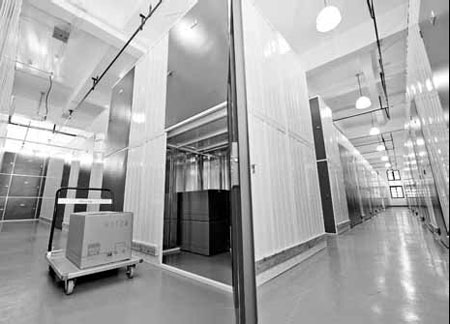Young, wealthy store their problems away
Updated: 2013-02-15 07:55
By Shi Jing in Shanghai (China Daily)
|
||||||||
|
A customer stores his personal belongings in a private locker at Easystorage in Shanghai. Individual consumers mostly use small and medium-sized storages to keep files, such as financial documents and personal items. Provided to China Daily |
|
Furniture and other belongings are unloaded from a truck and into a room at a Ministorage facility in Shanghai. Self-storage services have become popular among the wealthy in the city. Provided to China Daily |
|
A Ministorage facility in Shanghai. The self-storage company has been in operation in the metropolis for about two years. Provided to China Daily |
|
Larger storages are popular among entrepreneurs, small companies and trade show exhibitors who don't want to spend money on warehouse space. Provided to China Daily |

Self storage lends more than space, offers peace of mind
What is on your must-buy-luxury shopping list? Handbags, jewelry, watches? These days, extra space - a luxury not found in most apartments - through self storage is the new chic.
The self-storage industry, which was first established in the United States in the late 1960s, has grown substantially throughout the world during the previous few years. It has been especially popular in regions such as Japan and Hong Kong, where land is limited and priced at astronomical figures.
For those wishing to enjoy a long holiday without worrying about their new car in their community parking lot or have an organized living room, self storage allows them to simply sign a contract, pay, get the key to their own storage and pack their worries away.
In this sense, self storage is not considered by industry insiders as a necessity but rather as a luxury.
Easystorage in Shanghai has been in operation for about two years with seven locations.
Luo Rong, a sales manager at the company, said: "Location is always the top priority. We are aiming to set up one branch in every district in Shanghai. But it is a luxury. The customer has to have enough money at his disposal to purchase the service. For average consumers or elderly people, they will never put their things here.
"Our customers are mostly overseas returnees and well-off business people who have a better understanding of the benefits of self storage and the need for such services."
But Chinese consumers are rapidly accepting the idea of self storage. At present, 10 percent of Easystorage's customers are foreigners, while the rest are Chinese born in the 1990s.
Louis Hill, a representative of Drivers Jonas Deloitte, said: "The service is becoming increasingly popular as people get used to it. The main reason why people like self storage is because it is flexible, trustworthy and convenient. There's likely to be a great future for self storage in China as it gives lifestyle flexibility and convenience."
For individual consumers, they mostly use small and medium-sized storages to keep files, such as financial documents and personal items, Luo said.
Festivals also tend to bring in more business. Customers will store their personal belongings for two or three weeks while on vacation and retrieve them when they return, she added.
"Self storage in Shanghai is growing so rapidly that we analyze the industry regularly. Our manager often goes to Shenzhen, Hong Kong and Japan to conduct market research. We are also planning to set up a branch in Beijing. Our expansion plan is focused on first-tier cities, where there are more wealthy consumers who need such a service," she said.
In the West, the self-storage industry is already in full swing.
Maximilian Spitzy, general manager of Ministorage in Shanghai, said: "In the United States, you can expect to have one storage unit per 4,000 square meters. In the late 1990s, we introduced the idea of self storage to Europe. In 2008, we decided to bring the concept to China."
The company already has 35 self-storage facilities with a total of more than 250,000 square meters of storage in German-speaking Europe.
Learning from his peers' experience in Hong Kong, Spitzy decided the company had to buy its own property in the Chinese mainland when entering the market.
"Property prices in Hong Kong have risen so much that self-storage companies can't survive if they transfer that burden to customers. Therefore, we will always have our own property," he said.
Since Ministorage owns its properties, it can make building design decisions. Customers will also have more faith the company will not move or run away, Spitzy explained.
The current property that Ministorage owns in Shanghai is about 5,000 square meters, and the company plans to buy another two in the city. First-tier cities, such as Guangzhou, Shenzhen and Beijing, are also potential targets for expansion.
In Europe, 70 percent of self-storage customers are private individuals, with business people accounting for the rest. But in Asia, it's the other way around, with business accounting for 60 percent and individuals 40 percent, Spitzy said.
"There are more entrepreneurs and small companies in China. For a new startup, they don't want to spend a lot of money on a warehouse. So they rent 10 to 20 sq m at a self-storage company instead. We have many different customers. For example, China Mobile is one of our customers. They rented 100 sq m for server equipment," he said.
"We also have people who are moving to a new house. If the contract on their old house has already expired and the new one is not ready yet, they have to wait another two or three weeks before they can move in. So they just put their belongings in storage."
Trade show exhibitors are also a major segment of the self-storage industry.
"If a foreigner wants to attend exhibitions in Shanghai and has samples, he often sends them months earlier to make sure they clear customs in time. Once cleared, exhibitors can store their samples for the exhibitions," he said.
"We also have landlords as customers. Some of their tenants decide not to use the existing furniture in the apartment. Rather than having it renting out, many landlords prefer to spend a bit of money to keep the unneeded furniture in self storage," he said.
Most of the company's customers are young, adaptable and practical individuals who don't like crowded living spaces and prefer to store away off-season clothes.
"It's a very efficient and modern lifestyle. We target a specific group of people. Self storage is a lifestyle product. You just use it for two or three weeks to solve temporary needs. Ultimately, this is a luxury," he said.
Shi Yingying contributed to this story.
shijing@chinadaily.com.cn
(China Daily 02/15/2013 page9)

 In Photos: 7.0-magnitude quake hits Sichuan
In Photos: 7.0-magnitude quake hits Sichuan
 Li Na on Time cover, makes influential 100 list
Li Na on Time cover, makes influential 100 list
 FBI releases photos of 2 Boston bombings suspects
FBI releases photos of 2 Boston bombings suspects
 World's wackiest hairstyles
World's wackiest hairstyles
 Sandstorms strike Northwest China
Sandstorms strike Northwest China
 Never-seen photos of Madonna on display
Never-seen photos of Madonna on display
 H7N9 outbreak linked to waterfowl migration
H7N9 outbreak linked to waterfowl migration
 Dozens feared dead in Texas plant blast
Dozens feared dead in Texas plant blast
Most Viewed
Editor's Picks

|

|

|

|

|

|
Today's Top News
Live report: 7.0-magnitude quake hits Sichuan, heavy casualties feared
Boston suspect cornered on boat
Cross-talk artist helps to spread the word
'Green' awareness levels drop in Beijing
Palace Museum spruces up
First couple on Time's list of most influential
H7N9 flu transmission studied
Trading channels 'need to broaden'
US Weekly

|

|











